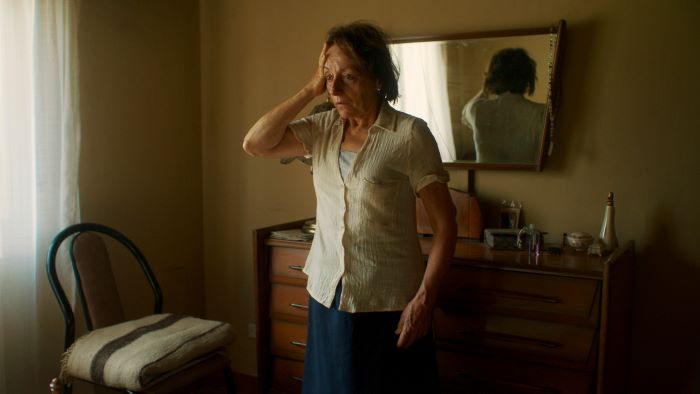![]() A woman in her sixties, Rita (Mónica Villa) is obsessed with sainthood. Not so much because of the goodness in her heart, but for the jealousy and envy it would bring to the other volunteers, all of whom spend most of their days at the local Argentinean Catholic church, attempting to impress the pastor. Rita is by far the most blatantly benevolent. She cleans the rural church to perfection while the other women gossip. While she kneels to pray, she notices a shaft of light coming through the church window. To be seen as pure and righteous, she moves so she’s bathed in the glow when the gabbing others enter.
A woman in her sixties, Rita (Mónica Villa) is obsessed with sainthood. Not so much because of the goodness in her heart, but for the jealousy and envy it would bring to the other volunteers, all of whom spend most of their days at the local Argentinean Catholic church, attempting to impress the pastor. Rita is by far the most blatantly benevolent. She cleans the rural church to perfection while the other women gossip. While she kneels to pray, she notices a shaft of light coming through the church window. To be seen as pure and righteous, she moves so she’s bathed in the glow when the gabbing others enter.
A knowing, dry humor permeates Tomás Gómez Bustillo’s feature debut. It’s reminiscent of sublime Bill Forsyth at his best. Bustillo’s humor is just as gentle while still wielding a sharp satirical scalpel. Rita, who Villa essays in a perfect sad-eyed deadpan, is not a particularly nice person, but because she is generally quiet and withdrawn, she can float slowly by. Her husband, Norberto (Horacio Marassi), adores her and wants nothing more than her love and attention, which he quietly sacrifices as Rita is obsessed with sainthood. Luck comes Rita’s way when she comes across a statue while cleaning the church that looks like a dead ringer for a statue thought stolen, and (perhaps not coincidentally?) the saint’s name is Rita. With this in mind, she attempts to stage a miracle to reap the celestial and, more to the point, earthly rewards that may come her way.
Things go awry in a shocking way, one in which I would be remiss to reveal, and the already wry, wise film deepens into something more thought provoking without giving up its whimsical charm. Rita is given the opportunity to take stock of her behavior: her need for validation from her friends, her competitiveness about being seen as the most spiritual, and particularly her treatment of Norberto. The final moment leaves us with a perfect grace note.
Bustillo, who also wrote the script, is a singular talent with a unique vision. Combining the heightened dry humor of Hal Hartley and the Coen brothers, the whimsy of the aforementioned Forsyth, and the exacting production design of a Wes Anderson production, Bustillo has created a unique experience. This is a quiet movie with a tinge of melancholy to go with its offbeat premise. It also never speaks down to its characters. Rather, it revels in their humanity and finds humor in their flaws.
Very few comedies, and ultimately this is a comedy, uses silence as well as Chronicles of a Wandering Saint. It takes guts to let silence sit for an excruciatingly long time, knowing that when it is punctured with the right word, the laughs will come, and here they do. Bustillo and cinematographer Pablo Lozano also manage to create humor and tension with wide shots, a practice most current comedies have given up on. It’s a testament to the filmmaker that he has created a personal, unique vision, particularly in the comedic realm, in a time of streaming oversaturation and bottom-line considerations. It would be a shame for him not to be awarded with a copious audience.







Leave A Comment